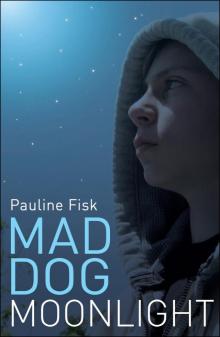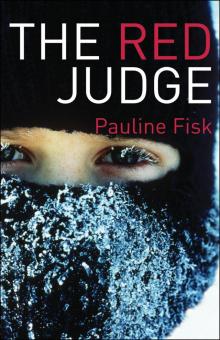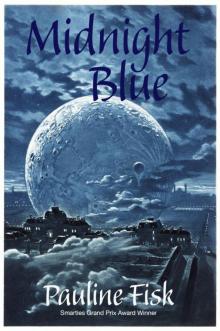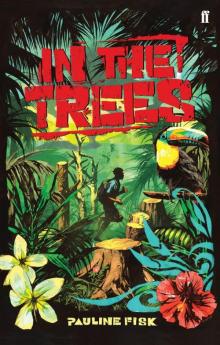- Home
- Pauline Fisk
Sabrina Fludde Page 2
Sabrina Fludde Read online
Page 2
Never seen herself before.
Phaze II hurried on, telling himself that it didn’t matter what the girl had seen or known or thought. It had nothing to do with him. The first rule of life was not to get involved, and the second was not to dream!
He passed the high town cross and started down the road on the other side. Time was ticking by and soon the town’s nightlife would begin. There’d be people on the streets again, especially in the wild west end and around the railway station. People full of drink and maybe even fight. It could get like that on a Friday night. Especially when the BC boys were in town.
Phaze II hurried on, pausing only to rifle through a final litter bin down by the railway station. Here he pulled out half a mega-pizza in a box and a crumpled bag of chips. It was a major haul. Marvelling at what people threw away, he carried on. Old Sabrina would be waiting, and she’d be hungry. She had ways of punishing him if he left her for too long. She wasn’t easy, Old Sabrina, but who could blame her? She had no one else to depend on. Only him.
The sweetest music
The girl spent her first night in the old, disused Mardol Cinema. It took a while to get into, but was worth the effort when she found it dry and warm inside. Its emergency lighting system was still working and there were even chocolate bars to be found in the back of a cupboard. The floors were still carpeted, and she curled up beneath the empty screen, sleeping like the dead until daylight awoke her.
It came seeping through the cracks around the emergency exit, bringing no clues to the time of day. The clock had long since stopped, leaving cinema-time at an eternal midnight. The girl crept into the ladies’ toilet – a marvel of dusty china basins, marble surrounds, shell-shaped lights and tall mirrors tinted pink. In these she could see her reflection again – a row of ragged girls with shoes too big to walk in comfortably. Her face was pinched, her hair a tangled mess and the grubby blanket, knotted under her chin, fit only to be thrown away.
But it was all the girl had brought with her. All she’d got, along with this reflection of a child she didn’t know. She looked at her body with its thin arms, legs and chest. Who was she? Who and what? She didn’t feel like a child inside herself – and yet why not?
She left the cinema the way that she’d entered, slipping between loose boards. Someone shouted, ‘What d’you think you’re doing?’ and she ran off into a network of alleys. It was easy to lose herself. The town was like a maze. She rambled around, looking for clues to who she was and where she’d come from. She went down to the bus station, looking for destinations that might sound familiar. Did the same at the railway station. Looked at people’s faces, wondering if she’d find somebody that she knew. Even stood in front of a television shop, waiting for a news item about a lost child – some frantic mother on the screen, calling for her daughter to come home.
But there was no news item, and night fell again. The girl headed back to the Mardol Cinema, but when she got there the boards had been renailed. What was she going to do? She tried the market hall, but it was locked for the night. Tried the shopping mall at the top of Pride Hill, but it was locked too. Tried the library, the castle and even the town museum. But everywhere was locked.
The girl ended up by the river, clambering beneath the castle wall, trying to find a way of getting in. Suddenly the ground slipped away beneath her. She hadn’t realised how steep it was – and now it was too late. A landslide of stones and loose soil took hold of her and swept her down a steep bank to the wall which ran behind the river path. Along the top of it had been erected a barricade of iron bars, jagged bits of glass and barbed wire. And built above the wall, at right angles to it, stood the railway bridge.
Its top was lit by platform lights, shining green and orange through a row of arched window panes. But its underbelly was as dark as ever. The girl watched the river flowing under it out of sight. Above her, a voice announced that the train due on Platform Seven was going to be late. Beneath her, a little mist rose from the river and drifted into the tunnel, where a wall full of graffiti announced:
NO HOPE!
NO LIFE!
GOD IS DEAD!
DIE BLOODY WELSH!
DIE BLACKS!
BLOODY FAIRY POOFTERS, OUT OUT OUT!
BORDER COMMANDOS RULE!!!
The girl shivered at the words, painted black, each dripping letter thick with hate. She turned to get away, as if the hate were directed at her personally. But more stones and earth came slipping down and she found herself trapped, unable to go forwards, unable to go back. Scared, lost and cold, she started whimpering. All the questions that she’d asked herself during the day came tumbling out.
‘Why me?’ she asked again. ‘What was I doing in that river? What am I doing here? Where have I come from? Where’s my home? Where’s my family? Why can’t I remember anything? Do I have a mother? Do I have a story? Do I have anybody out there?’
Desperately the girl struggled to remember back beyond that first moment on the river when the mist had parted and there she was. But there were no answers beyond the mist. There were no memories. For all her trying, there was nothing. She held her head and rocked back and forth. What was she going to do? She didn’t know. She tried not to think. Closed her eyes, tried not to move, but succeeded only in bringing down more stones and earth.
The girl cried out and a low note answered as if on cue. It came twisting through the darkness – a lonely sound which could have been anything from the nightly haunting of the town ghost to a train screeching overhead. At first the girl couldn’t make it out, but then she heard another note, and another. And then she realised. It was a tune.
A stupid tune! The girl almost laughed out loud. What she wanted was her memory, to rescue her with answers. But what she got was music instead! She looked around, trying to see where it was coming from, but the river path stood empty, and so did the railway tunnel. Nobody was here to play to her, but she could hear the tune all the same.
The girl listened to it, reluctant at first, but slowly lulled despite herself. How could it be otherwise? The tune sang out as if it were a living thing, soaring and swooping among the girders of the railway bridge, echoing up to its black stone arches and rolling across the river like mist. And its notes were words, and every one of them a song of secret comfort.
‘You’re fine,’ it sang out. ‘Really. Fine. You’re brave and strong and where you should be. There’s nothing to be frightened of. Everything is just fine. Trust me.’
And the girl did! The notes seeped into her like an enchantment, and suddenly she was fine! She knew she was, just like the tune said. She didn’t feel sorry for herself any more. She didn’t feel frightened. She felt safe.
For the first time, the girl noticed how beautiful the night had become. She looked around her, and the air was glittering with frost. The bridge wasn’t dark any more, but sparkling with jewels of ice. The stones and earth around her were covered with diamonds, and the glass along the top of the wall shone with bright spangles.
It was a jewel of a night, and the river formed its backdrop, as black as polished ebony. The girl found a pile of frozen leaves and lay her head upon them. The mist came off the river and wrapped itself around her, as soft and warm as a fur stole. Tomorrow she might wake up frozen to the bone, but tonight everything was just fine.
The girl closed her eyes and let the sweetest music pour through her mind, whispering that she wasn’t lonely, lost, cold and wretched – whispering that she had a home somewhere, and she would find it one day soon.
Her breath came slow and calm and even. The frayed edge of her little knotted blanket lay beneath her cheek. Her dress clung to her body, freezing over. Her stolen sweater froze too. But as she fell asleep, she felt brave and strong and safe.
Hallowe’en
Bentley packed away the saxophone and left his hideaway under the railway bridge. It wasn’t really late, but his mother would begin to worry if he didn’t get back home. He emerged from the tunnel, sorry as always
to be leaving behind his secret concert hall, with its wonderful echoey acoustics. There was nowhere like it in town, not even the music hall or the perfect amphitheatre of the Quarry Park. Not even the town churches, where he sometimes played the organ and his father rang the bells.
He headed for home, reliving his evening’s playing. He had come here countless times before to practise his favourite pieces, confident that the bridge’s acoustics would cover his mistakes. But tonight there had been no mistakes. Music had poured through him like a river on its way somewhere. He’d played like an angel and he knew it, blowing up into the arches and girders of the railway bridge, and down through the mist. If Dad had heard him playing like that, he would have been proud. And if he’d only played like that at home, Mum would have been less likely to scold him for wasting time and not getting on with his homework.
Bentley reached the archway in the old town wall, stopped to take a final glance back at the bridge, then turned up the lane for home. Somewhere in the town, a clock struck eleven. It was later than he had realised, and he broke into a trot which didn’t stop until he reached Pride Hill. Here the wide sweep of the town’s main shopping street was empty save for a lone cellist sitting in a doorway playing to himself.
At the sight of the cellist, dressed in dinner jacket and bow tie, Bentley would have turned back and gone another way. But he wasn’t quick enough. The cellist looked up. On the ground in front of him was a black top hat in which lay his evening’s takings. Pinned to the hat were the words JULIAN BOYD-WIBBLER, FIRST CELLIST WITH THE PENGWERN CONSERVATOIRE. Fallen Upon Hard Times.
It was meant to be a joke, but when the cellist was your father and some days he was PANCHO THE PAN-PIPE-PLAYING PERUVIAN, Fallen Upon Hard Times, and sometimes PADDY MC-BY-THE-WAY, UILLEAN PIPE MASTER, Fallen Upon the Potato Famine – there for all the town to see beneath the hats as Mr Bytheway, the music teacher – it wasn’t very funny.
‘Evening, Bentley,’ Dad said, continuing the fast movement of a cello concerto without dropping a note. ‘What are you doing with my saxophone?’
‘What are you doing, more to the point?’ Bentley said, blushing and thrusting his father’s saxophone behind his back. ‘You know how mad Mum gets when you go out busking! Especially on a night like this, with not a soul about to fill your hat!’
They both looked at the pennies in the bottom of the hat. A cold wind was blowing up the hill, and Bentley shivered. Dad stopped playing at last, and the sudden silence was eerie. He started packing up.
‘Your mum says busking doesn’t pay, but we’ll show her one day,’ he said, pocketing the pennies in the top hat. He winked at Bentley.
Bentley winked back. The two of them walked home together, hunched against the wind. It was nearly Hallowe’en and the shop windows were full of witches’ masks and leering orange pumpkins. The streetlamps had been smashed in Dogpole Alley, and they had to crunch over broken glass to get up the front steps.
‘It’s always the same, this time of year,’ Dad complained. ‘Hallowe’en seems to bring out the worst in people. Broken glass and stolen sweaters. All tricks and no treats!’
They slipped into the house, shutting the door quietly as if they could sneak in without Mum noticing. Dad stopped to store the instruments in the downstairs room he called ‘the music school’, and Bentley hurried upstairs hoping that Mum would be in bed. But she was still up in the living room, sitting at her sewing machine with an eye on the clock.
‘Where have you been?’ she said when he came in. ‘Busking with your father? No, don’t tell me! You should be working for good grades, not playing on the streets and making fools of yourselves!’
Dad followed Bentley into the room. ‘Once you used to love this fool for his music,’ he said.
‘I loved you for yourself, not Julian Boyd-Wibbler!’ Mum said.
‘You wouldn’t say that if you knew how much he’s made!’
Dad tipped out his evening’s pennies and Mum looked at them and burst out laughing. She shook her head as if she knew she couldn’t win, put aside her sewing and they all went to bed.
In the morning Bentley woke up late for school. The alarm clock lay across the room where he had thrown it. Mum had already gone to work, and Dad was nowhere to be seen. A note on the table informed Bentley that if he wanted cereal, he’d have to nip out and buy milk.
Bentley didn’t bother with the cereal, or any other breakfast, and hurried off to school knowing he’d be late. He forgot the only bit of homework that he’d managed to get done, and his physics teacher made him stay for detention at the end of the day. When he finally came out of school, it was getting dark. He trailed through town feeling sorry for himself. He was starving hungry, having forgotten lunch as well as breakfast, but knew that when he got home he’d have to face Mum, who would have been phoned about the detention.
So he drifted round the town, putting off the evil moment by mooching round the shops. Finally they began to close and Pride Hill started emptying. The newspaper sellers shut up for the night and even the town beggars disappeared for a quiet break before the night’s trade.
Bentley turned for home at last. What else could he do? Only a few moments ago the town had thronged with life, but now everything seemed quiet and eerie. In Dogpole Alley, the streetlamps were still broken, and in the darkness he imagined ghosts and ghouls ready to jump out. This was Hallowe’en night, after all! Not that Bentley believed in ghosts and ghouls, of course!
All the same, he made a quick dash for it, getting halfway down the alley before the BC boys started coming the other way. The BC boys – far more trouble than ghosts and ghouls! Bentley headed for his front door, and the boys came whooping down the alley, dressing in Hallowe’en masks and chasing somebody. Bentley fumbled for his front-door key, pitying whoever it might be, but telling himself that it had nothing to do with him. After all, he knew what Border Commandos were like! Some of them were still in school, and if you dared to get in their way they could make your life a total misery.
Bentley’s key wasn’t in his pockets, so he started on his school bag. The BC boys’ quarry had nearly reached him, and they were right behind. He could hear their panting, and see them in a solid mass, yelling, ‘Trick or treat!’ through their masks at what was nothing but a little girl.
Just a child, half their size!
Bentley couldn’t quite believe that even BC boys would waste their time on a little girl. He stared at them contemptuously. The girl drew level with him. Her shoes were too big for her and she kept tripping over. Briefly he caught a glimpse of her white face, then she turned towards the Seventy Steps, which led down from the alley to the bus station. The Seventy Steps, where anything could happen in the darkness! And it often did.
Behind her in the alley, the BC boys howled with delight. They’d got her now! They knew they had! They headed for the steps as well, devils in plastic masks – and if anybody was going to stop them, they’d have to do it now!
Bentley didn’t even pause to think about it. He shouted at the girl. The BC boys would get him for it, but he did it all the same.
‘Not down there! This way!’
The girl turned, saw Bentley waving at her, and seized her chance. She whirled about and leapt up the steps before the boys could grab her. Bentley found his key as if by magic. He unlocked the door and the two of them tumbled inside.
The BC boys howled with rage. ‘Witch! Bitch! Little gypo vampire-girl! Out, out, out!’ they yelled.
The girl backed down the hall, her eyes two perfect moons, round and shining with fear. Bentley bolted the door, glad that it was old and solid. He leant against it, unable to stop shaking as he waited for the BC boys to charge.
But as if they knew that they were beaten for today, the BC boys gave up. Bentley heard a last few yells, then silence settled over Dogpole Alley. Bentley closed his eyes, wondering what had come over him, and knowing that the BC boys would make him pay. And when he opened them again, there was the girl, staring at
him.
She wore nothing that would keep her warm, just a lacy sweater which wasn’t really thick enough, and a little ragged blanket-thing knotted under her chin. Her hair looked as if it hadn’t been washed for weeks, and her face was stretched to breaking point by sheer exhaustion. Bentley could see it in her eyes, along with the fear. Fear of him as well as everybody else. Fear of everything, including this dark, silent house.
‘I won’t hurt you. I only want to help you. I’m not like them,’ Bentley said.
He unbolted the front door, as if to say that she was free to go. But she looked at him, and suddenly he realised that she had nowhere else. And when he started up the stairs, she followed him.
Part Two
River Fortress
Abren
The boy turned on the light as they started up the stairs, revealing a worn strip of carpet and a high, moulded plaster ceiling, a row of hooks on the wall and coats piled on them. The girl followed him up into the winding darkness. They passed a single door on the first floor, then carried on to the top of the house. Here, beneath sloping eaves, she found a succession of rooms nestled together. Some were bedrooms. One was a junk room. One was a bathroom. And one was the boy’s room, his name, BENTLEY, stencilled on the door.
Behind this door, the girl found a clutter of shelves, desk, chests of drawers and a bed, all tucked between a dusty skylight and an old oak frame. Books lined the frame, which doubled as a shelf. A pile of old records, mostly out of their sleeves, lay in the corner, and photographs of musicians in nightclubs hung on the walls.
The girl looked at the photographs while the boy, Bentley, threw his school bag on the bed. She wanted to thank him, but didn’t know where to start. He pulled off his jacket and put on a record. Immediately a voice called from downstairs.

 Mad Dog Moonlight
Mad Dog Moonlight The Red Judge
The Red Judge Midnight Blue
Midnight Blue Sabrina Fludde
Sabrina Fludde In the Trees
In the Trees